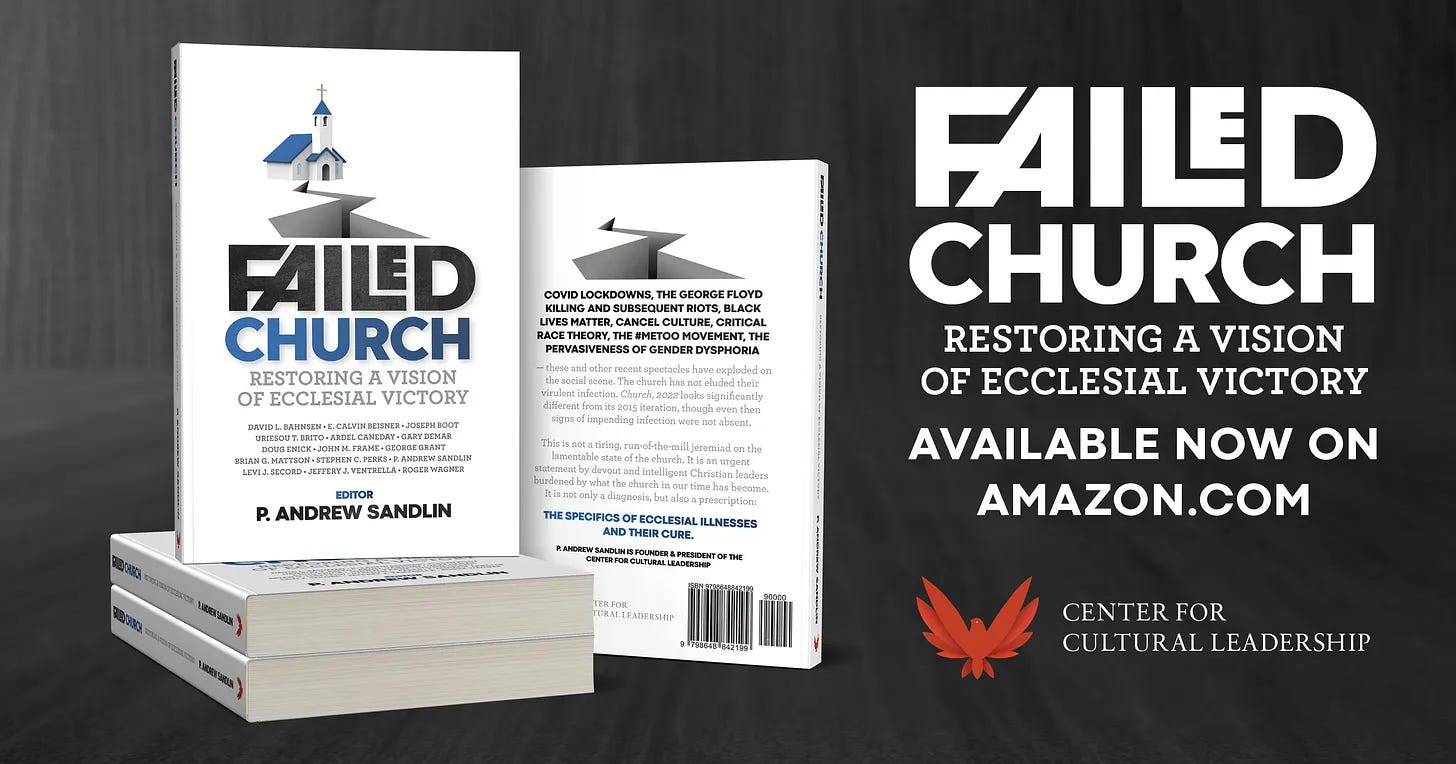Trust and Obey, There’s No Other Way
Only those who live in faith and obedience are the Lord's children who will enjoy his delights in this life, and only they will be gifted eternal life in the end.
Dear friends and supporters:
Beware when anybody offers a word or phrase as the key to unlock biblical truth or the silver bullet to gun down all theological error. The Bible is too multivalent for that reductionist simplicity.
However, specific words and phrases can often capture a lot of the biblical data and, in this way, be extremely helpful in explaining biblical truth. On the question of how man relates to God, one of the very best (in my view) is the title of the warm old gospel hymn, “Trust and Obey.” Man’s basic responsibility to God, from creation through the eternal state, can be summarized as trust and obey, faith and obedience.
Trust and Obey in the Bible
The Garden
God created Adam and Eve sinless, and placed them in a lush paradise and required of them simply to trust and obey: trust in God entirely and obey his word to live a life full of uninhibited delight.
The diabolical serpent provoked them to sin by leading them to turn their back on Trust and Obey: “Eve, did God really say what do you think he said? Did he really mean it? And even if he did, it doesn’t matter; you can disobey and get greater benefits in your radical autonomy. Distrust and disobey God to live The Good Life.”
This intentional abandonment of Trust and Obey plunged the entire human race into sin.
Noah
The Fall introduced momentous changes into man’s experience in the created world and in his relationship with God, but it did not change his basic responsibility to God: Trust and Obey.
The sinful world eventually apostatized into an unspeakable depravity. Only one godly man, Noah, and his family survived. He was protected from God‘s global deluge because he walked with God (literally, “rubbed shoulders” with God): He found grace in God’s eyes because of his trust and obedience (Gen. 6:6-9). We dare not assume God would have protected him had he merely trusted God but not obeyed: “By faith Noah, being divinely warned of things not yet seen, moved with godly fear, prepared an ark for the saving of his household, by which he condemned the world and became heir of the righteousness which is according to faith” (Heb. 11:7). Noah inherited righteous standing before God by an obedient faith.
Abraham
God then narrowed his focus to another man, a pagan, Abraham, and gave glorious promises to him and his descendants, which would later be called Israel. We learn from Hebrews 11 that Abraham was a great man of faith, the father, in fact, of the faithful. God blessed him because he trusted and obey. He trusted God enough to leave his father‘s household and go to a place not one blessing of which he could see. He trusted God‘s promises that he would have a descendent, despite the fact that he and his wife Sarah were beyond the age of childbearing. Despite occasional failures, this man obeyed God in his word all his remaining days.
We learn from Galatians 3 that Jesus Christ himself is the consummate Seed of Abraham. We cannot understand the history of the Jews, and, for that matter, the new covenant church, apart from Abraham, whose marching orders were Trust and Obey.
Israel
By giving the law to Moses at Mount Sinai, God entered into a formal covenant with the Jews as a nation. He told them in Exodus 19 of his great love for them, how he would bear them up above all other nations on eagles’ wings, and he subsequently gave them his gracious law. That’s always the right sequence: covenant precedes law.
The Jews were governed by this covenant, sometimes called the Mosaic or the old covenant. It was fully a covenant of grace and, therefore, of obedience. It was not a legalistic covenant, just as the Abrahamic covenant was not a covenant without obligations. Grace can never be merited, but grace always brings obligations (Tit. 2:11–12). God later made clear that he did not elect Israel due to her virtue. All to the contrary:
“Do not think in your heart, after the Lord your God has cast them out before you, saying, ‘Because of my righteousness the Lord has brought me in to possess this land’; but it is because of the wickedness of these nations that the Lord is driving them out from before you. It is not because of your righteousness or the uprightness of your heart that you go in to possess their land, but because of the wickedness of these nations that the Lord your God drives them out from before you, and that He may fulfill the word which the Lord swore to your fathers, to Abraham, Isaac, and Jacob….” (Dt. 9:4–6)
Israel was chosen solely by grace and called to faith and obedience. Tragically, during most of its history, she forsook Jehovah. They did not trust and obey. The Jews hearts turned away to the pagan gods of the nations around them, whose depraved practices they wished to imitate.
There were, however, a minority among them, like Isaac and David and Moses and Joshua and Samuel and Josiah and Elijah and the other great prophets who did trust and obey.
There are no examples of those who trusted God but did not obey, or obeyed God without first trusting him, as if that were possible. It’s a single inescapable unity: Trust and Obey.
Jesus Christ
The incarnate Son of God came as the fulfillment of all of the great messianic prophecies of the Hebrew Scriptures, and he came preaching the gospel of the kingdom. That gospel is the good news that God in Jesus Christ is reversing everywhere the curse God unleashed in the Garden due to man’s sin (see “Gospel or Salvation?”) Jesus Christ is God‘s sin-killer. In the words of his forerunner John the Baptist: “Behold, the Lamb of God, who takes away the sin of the world” (Jn. 1:29).
Jesus gathered around himself apostles and other disciples. His message to them was to have faith in him as the perfect representative of the Father, equal to God but still his own Person, and he commanded, “Follow me.” To be a Christian, a Christ-follower, is to Trust and Obey.
The New Covenant
The new covenant in Christ’s blood-shedding was a promise of the Hebrew Scriptures (see one example in Jer. 31:31–34). God in the new covenant no longer remembers the sins and iniquities his people as they were brought to mind annually in the repeated old covenant sacrifices, since in the new covenant Christ himself as God’s Great High Priest once and for all put away man’s sin (Heb. 9–10). God inserts his law into the believing sinner’s heart, that is, gives him a disposition to obey. It is in these senses that the new covenant is superior to the old covenant. We are called to faith in Jesus Christ, and to follow his words as they’re found in the Bible.
The Gospel in its new covenant context was first preached fully at the post-resurrection Pentecost (Ac. 2). Peter made the case from the Hebrew Scriptures that Christ died for man’s sins, rose from the dead, and ascended to take David’s throne, ruling over the world. Sinners are commanded to repent, trust in Christ, and follow him.
At its heart the new covenant is about Trust and Obey, and every new covenant speaker or writer found in the Bible (following their predecessors in the Hebrew Scriptures) preached it.
Failed Church Back in Print
Church 2023 looks significantly different from its 2015 iteration, though even then signs of impending infection were not absent.
Covid lockdowns, the George Floyd killing and subsequent riots, Black Lives Matter, cancel culture, Critical Race Theory, the #MeToo Movement, the pervasiveness of gender dysphoria — these and other recent spectacles have exploded onto the social scene. They have been such an unremitting part of our social environment over the past 2 to 5 years that they have insinuated themselves into our social currency, and it is difficult to objectively assess the state of recent culture while ignoring them.
The church has not eluded their impact. In some cases — the lockdown orders for all “nonessential” services comes to mind first — they have drastically shaped the very life of the church. Black Lives Matter, Critical Race Theory, and the #MeToo Movement have almost equally stamped themselves on a wide swath of Western Christianity, including conservative Christianity.
Order softcover and digital copies here.
“Salvation by Grace” in Folk Reformation Soteriology
The Protestant Reformation recovered a soteriology (salvation doctrine) of the preeminence of grace, or, more accurately, the preeminence of Christ. Because of this, some modern children of the Reformation hold the folk soteriology that the Reformation was basically about salvation by grace, with obedience and good works tacked on as an ancillary byproduct. In fact, if we emphasize obedience too much, we might tiptoe back toward medieval Rome.
This assumption is diametrically wrong. Luther, Calvin and Knox no less than Cardinal Bellarmine and the Council of Trent stressed the absolute necessity of good works, though in a different way. The medieval church had buried grace under an avalanche of a complex sacramental system by which we achieve salvation over our lifetime as we cooperate with the church and its sacraments, performing good works and staying in the church‘s good graces. Salvation was, in effect, by sola ecclesia: church alone.
The Reformers in no way demeaned the church (meaning, of course, Christ’s true church), but wanted to say that salvation is in Christ alone. It is appropriated by faith, man’s casting himself completely on Jesus Christ in his great redemptive work. The sinner is justified (declared legally righteous) not in a process, as was understood by the Roman church, but as a divine verdict over the one who truly believes. To this believing sinner Christ’s righteousness is imputed, or credited in union with Jesus Christ (See “Why Justification?”)
But not only imputed. Simultaneously, Christ’s righteousness is is imparted. This impartation is not the righteousness God looks at in justification, but it is no less essential. Calvin said it best when he noted that the basic truth of salvation is union with or incorporation into Jesus Christ, and that union includes sanctification (set apart for God) no less than justification. Therefore, whoever is justified is also sanctified. And if there is no sanctification, there’s no justification. This means we’re saved by faith and not by works, but we are never saved by a faith without works, because that is a dead faith. (See “A Note on faith, Works, and Justification.”)
This solves the problem of James (ch. 2:14ff.). Actually, there’s no “problem” in James or the rest of the Bible. The problem is in us. We are justified by works (as James plainly writes) in the sense that we are justified by a working, obedient faith. A nonworking faith is a false faith.
False Alternatives to Trust and Obey
Within Christendom, three popular alternatives to Trust and Obey stand out, one non-conservative and two conservative.
Moralism
The first is the province of Protestant liberalism. It lops off faith from obedience. Trust in the crucified, risen and reigning Son of God is considered hopelessly prescientific and outmoded, but obedience (redefined as moralism, “do-good-ism”) is salutary and all that’s left of following Jesus. Champion “social justice,” work to eradicate “climate change,” and stand for “trans” rights, and you’ll be the only kind of Christian it’s possible to be in the postmodern world. There’s no longer biblical trust, and obedience is transformed into the latest progressive talking points. For these and other reasons, theological liberalism is not Christian.
Secret, Eternal Decrees
But think now of the conservative church. The Reformers recovered, not only the priority the of grace of God in salvation, but also the biblical doctrine of predestination, which did not play a significant part in large swaths of Christian soteriology for many hundreds of years. One way we protect grace is by recognizing that God predestinates to salvation, and this predestination necessitates the election of individuals. After all, if salvation is predestined, it cannot be on the basis of one’s merit, performance, or good works. This is precisely what the Bible teaches (see, for example, Ephesians 1 and Romans 9).
But in subsequent Reformation development, predestination and election were enlisted to carry more soteric weight than the Reformers originally intended. The Bible’s soteriology from the standpoint of Christ’s work for man in history is best understood in terms of the covenant (Trust and Obey). God’s standpoint is predestination and election.
Today God’s necessarily eternal and secret works of predestination and election are often made the rationale for specific events in history: “My friend didn’t listen to the gospel I shared with him because he’s not elect”; or, “Our state shut down ‘nonessential’ churches during Covid, so we had better not resist this act as God’s predestined plan”; or, “I dare not pray for God to heal my cancer, because it is predestined.”
The approach of the saints in the Bible is far different. We are called to live not in terms of our finite and shortsighted interpretation of God’s decretal will, but rather in terms of his revealed will in the Bible. We are called to Trust and Obey.
Unconditionality
Finally, consider the frequent talk of God’s “unconditional” grace or salvation or covenant dealings with man. Although it’s true that election (pre-temporal and eternal) is unconditional, salvation and man’s life before God never is. God chooses us to salvation not on the basis of our foreseen faith or merit. But in his dealings with humanity within history, he always deals covenantally, that is, conditionally.
Every covenant in the Bible is bilateral (the Noahic is the rare exception). By bilateral, I mean that both parties voluntarily bind themselves to conditions (see “The One Eternal Covenant”). If Abraham had not left his pagan homeland Haran, he would not have fathered the Jews and many other nations. When the majority of the ancient Jews turned away from God in apostasy, they were cut off and eternally destroyed (Heb. 2:1–3). If believers in the new covenant abandon Jesus Christ, they too will be cut off (Rom. 11:16–22). All those who trust in Christ are eternally secure, but those not trusting in Christ are not eternally secure (Mt. 10:33). Faith in and obedience to Jesus Christ are a condition of God’s temporal and eternal blessing. It’s always Trust and Obey.
Conclusion
Our obligation to God is simple, though not always easy: Trust and Obey. We’re not called to speculate about who God is, because he tells us who he is in his word, particularly in Jesus Christ, who reveals the fullness of God (Heb. 1:3). We’re not charged with speculating about how he wants us to live, because he tells us precisely how to live in his word, the Bible. We are called simply to trust him and obey him.
There is simply no other way.
Will you consider a tax-deductible donation to CCL via PayPal or Venmo? Or mail a check to CCL, Box 100, Coulterville, CA 95311. God uses you to keep us going — and expanding.
Personal
Many of you know that my father (90 years old in October) has lived with my wife Sharon and me since January. He suffers from congestive heart failure. One of its chief symptoms is extreme fatigue. He is presently suffering greatly from that fatigue. He sleeps about 21 hours a day. Please continue to pray for him as well as my wife and me during this difficult time.
Next week I’ll answer “What Is the Christian Worldview?” Meanwhile, why not share this e-newsletter?
Thank you deeply for your friendship and support.
Yours for the King,
Founder & President, Center for Cultural Leadership
More great stuff:
The Center for Cultural Leadership site is here.
My Amazon author page (print and digital) is here.
My I-Tunes sermons, lectures and podcasts are here.
You can find my sermons and lectures at my YouTube channel.
Sign up to get my blog updates here.
Here’s my Twitter feed.
If you want to get the free exclusive hard copy publication Christian Culture, please send me a Facebook private message.
The CCL phone number is 831-420-7230.
The mailing address is:
Center for Cultural Leadership
P. O. Box 100
Coulterville, CA 95311






